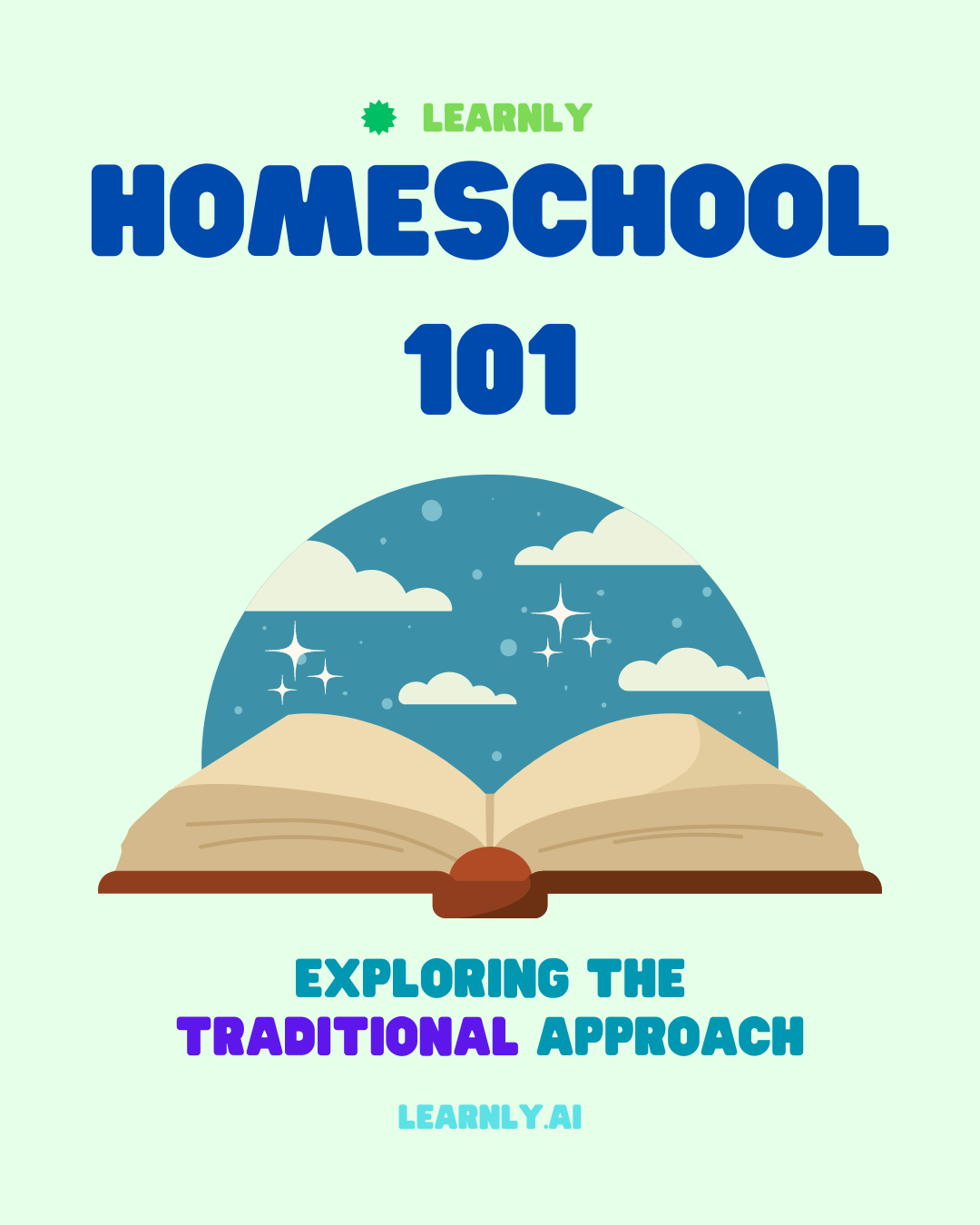Introduction to the Traditional Approach to Homeschooling
Imagine a world where a child's education is tailored to their individual needs and interests, learning is not confined to a classroom or a set curriculum, and the bonds between family members are strengthened through shared learning experiences.
This world exists in the realm of traditional homeschooling, a method of education that has been around for centuries but is still shrouded in mystery for many.
Traditional homeschooling is a unique approach to education that emphasizes personalized learning and family involvement.
Unlike mainstream education, where students are grouped by age and taught a standardized curriculum, homeschooling allows children to learn at their own pace and explore subjects that interest them.
It also provides opportunities for parents to take an active role in their child's education, fostering a strong sense of family unity and collaboration.
But homeschooling is not without its challenges.
It requires a significant commitment of time and resources from parents, who must be willing to take on the role of teacher, mentor, and curriculum designer.
It also requires a certain level of discipline and self-motivation from students, who must be able to manage their own schedules and work independently.
Despite these challenges, traditional homeschooling has become an increasingly popular option for families looking to provide their children with a unique and personalized education.
In this series, we will explore the history and philosophy of homeschooling, the benefits and challenges of this approach to education, and practical tips and resources for families considering this path.
Join me on this journey as we delve into the fascinating world of traditional homeschooling and discover the many ways it can enrich the lives of families and children alike.
What is the Traditional Approach to Homeschooling?
The traditional approach to homeschooling is rooted in the belief that children should be educated in a way tailored to their individual needs and interests.
This approach emphasizes the role of parents as primary educators.
It encourages using traditional teaching methods such as textbooks, workbooks, and hands-on learning experiences.
While this approach may not be for everyone, it has been shown to be highly effective in helping children achieve academic success and develop a lifelong love of learning.
At its core, the traditional approach to homeschooling is all about flexibility.
This approach allows parents to create a customized curriculum that meets their child's unique learning needs and interests, enabling them to adjust their teaching style as needed.
Whether employing manipulatives to teach math concepts or incorporating field trips and hands-on experiments to teach science, the traditional homeschool approach encourages parents to be creative and adaptive in their teaching methods.
Another key aspect of the traditional homeschool approach is the emphasis on family involvement.
Because parents play such a crucial role in their child's education, homeschooling often creates a strong sense of family unity and collaboration.
Parents can use this time to not only teach their children academic subjects but also to impart essential life skills, such as time management, goal-setting, and personal responsibility.
While the traditional approach to homeschooling may be seen as old-fashioned by some, it actually incorporates many modern tools and technologies.
For example, parents can use online learning resources, educational apps, and social media to enhance their child's education and connect with other homeschooling families.
This approach allows parents to create a rich and engaging learning experience that goes far beyond the limits of a traditional classroom.
Ultimately, the traditional approach to homeschooling is about empowering parents to take an active role in their child's education and providing children with a learning experience tailored to their unique requirements and appeals.
Whether exploring the wonders of the natural world, mastering a foreign language, or developing a deep understanding of historical events, the traditional approach to homeschooling offers endless possibilities for growth and discovery.
So, if you're looking for a way to provide your child with a truly individualized education, the traditional approach to homeschooling may be just what you're looking for.
Who Should Use the Traditional Approach to Homeschooling?
A traditional homeschool approach is an excellent option for families who want to take a more active role in their child's education.
Suppose you are looking for a way to provide your child with a truly personalized learning experience tailored to their needs and interests.
In that case, the traditional approach to homeschooling might be the right choice for you.
Homeschooling can be a good fit for families who value flexibility in their daily schedules.
With traditional homeschooling, parents have the freedom to set their own schedule and structure their child's education in a way that works best for them.
This can be especially helpful for families with busy schedules or those who travel frequently.
If you are concerned about the quality of education that your child is receiving in a traditional school setting, then homeschooling may be a good option to consider.
Homeschooling can provide a more personalized and hands-on approach to learning, which can be especially beneficial for children who need extra attention or support.
The traditional approach to homeschooling can also be a great option for families who want to build stronger relationships with their children.
Because homeschooling allows for a more individualized and collaborative learning experience, it can foster a strong sense of family unity and connection.
Finally, the traditional homeschool approach can be a good fit for families who want to provide their children with a more holistic education.
Homeschooling allows parents to incorporate important life skills and values into their child's education, such as problem-solving, critical thinking, and personal responsibility.
Providing children with a well-rounded education that goes beyond the traditional classroom, homeschooling can prepare them for success in all areas of life.
Why Choose the Traditional Approach to Homeschooling?
One of the most significant advantages of the traditional approach to homeschooling is the ability to tailor your child's education to their individual needs and interests.
This approach allows parents to create a customized curriculum considering their child's learning style, strengths, and weaknesses.
By providing personalized instruction, parents can help their children reach their full potential and develop a lifelong love of learning.
The traditional approach to homeschooling also offers a great deal of flexibility.
Homeschooling allows families to set their own schedule and pace, which can be especially helpful for children who need more time to master certain concepts or have other commitments, such as extracurricular activities or part-time jobs.
This flexibility can also benefit families who travel frequently or live in remote areas.
Another advantage of the traditional approach to homeschooling is the ability to focus on character development and family values.
Because parents are the primary educators, they can incorporate necessary life skills, such as personal responsibility, respect for others, and time management, into their child's education.
This approach can help children develop a strong sense of personal integrity and deep respect for themselves and others.
Homeschooling can also provide children with a more nurturing and supportive learning environment.
In a traditional classroom setting, children can often feel lost or overlooked, especially if they struggle with certain subjects or have different learning needs.
Homeschooling can provide a more supportive and encouraging environment where children can receive the one-on-one attention and support they need to succeed.
Finally, the traditional approach to homeschooling can help children develop a lifelong love of learning.
By allowing children to explore subjects that interest them and encouraging them to take ownership of their education, homeschooling can help them become more engaged and invested in their learning.
This can lead to greater curiosity and a deeper understanding of the world around them, which can be invaluable as they grow and develop.
How to Use the Traditional Approach to Homeschooling
The traditional approach to homeschooling is centered around a structured curriculum that can be tailored to meet your child's individual needs.
To get started, you must choose a curriculum that aligns with your educational goals and your child's learning style.
Many homeschooling parents use pre-packaged curricula with lesson plans, textbooks, and other resources.
One of the keys to success with the traditional homeschooling approach is establishing a daily routine.
This routine should include set times for academic subjects and time for breaks, meals, and physical activity.
By establishing a routine, you can help your child stay on track and develop good study habits that will serve them well in the future.
Another critical aspect of the traditional homeschooling approach is creating a supportive learning environment.
This means providing your child with the tools and resources they need to succeed, such as a quiet study space, educational materials, and access to technology.
It also means being available to answer questions and provide guidance as needed.
As you work with your child to develop their academic skills, focusing on character development and socialization is crucial.
This can include activities such as volunteer work, sports, and community involvement.
By providing your child with a well-rounded education that includes both academic and social skills, you can help prepare them for success in all areas of life.
Finally, it's important to stay connected with other homeschooling families and support groups.
This can provide a valuable source of advice, encouragement, and socialization for both you and your child.
Many homeschooling families also participate in co-ops or other educational programs that allow their children to learn and socialize with others outside of the home.
By staying connected and engaged with the homeschooling community, you can help ensure your child receives a high-quality education that prepares them for a bright future.
Conclusion
In conclusion, the traditional homeschool approach is a popular and effective method of educating children at home.
This approach emphasizes a structured curriculum that can be tailored to meet each child's individual needs and interests.
It offers flexibility, personalized instruction, and a supportive learning environment to help children develop strong academic and social skills.
Additionally, it allows parents to focus on character development and family values while encouraging children to take ownership of their own education.
While the traditional approach to homeschooling may not be suitable for every family or every child, it offers many benefits that can help prepare children for success in all areas of life.
To use this approach effectively, parents should choose a curriculum that aligns with their educational goals and their child's learning style, establish a daily routine, create a supportive learning environment, and stay connected with other homeschooling families and support groups.
Overall, the traditional homeschool approach can be an excellent choice for families looking for a personalized, flexible, and supportive educational experience for their children.
By providing children with a well-rounded education that focuses on academic, social, and character development, parents can help prepare their children for a bright and prosperous future.
Resources & Tools
Here are some resources and tools that can help readers learn more about the traditional approach to homeschooling:
-
Homeschool.com - a comprehensive website with resources and information on homeschooling, including the traditional approach.
-
The Well-Trained Mind by Susan Wise Bauer and Jessie Wise - a popular book that provides a step-by-step guide to using the traditional approach to homeschooling.
-
The Classical Homeschooling Curriculum - a resource that provides a structured curriculum based on the traditional approach.
-
The Charlotte Mason Method - a popular approach to homeschooling that focuses on a well-rounded education, including literature, art, music, and nature study.
-
Ambleside Online - a free online curriculum based on the Charlotte Mason Method.
-
Time4Learning - an online learning platform that offers a traditional approach to homeschooling, including interactive lessons and assessments.
-
Khan Academy - a free online resource with video lessons and practice exercises on a wide range of subjects, including math, science, and history.
-
Homeschool Legal Defense Association - an organization that provides legal support and advocacy for homeschooling families.
-
Homeschool World - an online community for homeschooling families, with forums, resources, and information on the traditional approach to homeschooling.
-
Local homeschooling groups and support organizations - many communities have local groups and organizations that provide resources and support for homeschooling families.
/>





